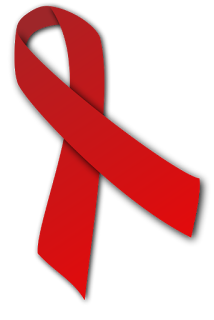New infections have fallen by 35% since 2000 and AIDS-related deaths by 24%. Some 16 million people are now receiving antiretroviral treatment – more than 11 million of them in Africa. Ten million men in East- and Southern Africa have volunteered for medical male circumcision – a procedure that reduces a man’s risk of contracting HIV by 60%.
 |
| The red ribbon is the global symbol for solidarity with HIV-positive people and those living with AIDS. |
On World AIDS Day, new WHO recommendations will launch to help achieve these targets. These include the use of innovative HIV testing methods; customizing treatment approaches to meet the full diversity of people’s needs; and offering a wider spectrum of prevention options.
Some low- and middle-income countries are already fast-tracking national AIDS responses. Countries do best when they make substantial domestic investments, base their HIV health-sector programmes on good data and simplify prevention and treatment programmes. Twelve countries have ensured that 60% or more of all people living with HIV are aware of their HIV infection and receive antiretroviral treatment.
Pioneering countries like these show that the new targets set for ending AIDS are feasible – even in resource-limited settings.
About The World AIDS Day
World AIDS Day, designated 1 December every year since 1988, is dedicated to raising awareness of the AIDS pandemic caused by the spread of HIV infection, and mourning those who have died of the disease. Government and health officials, non-governmental organizations and individuals around the world observe the day, often with education on AIDS prevention and control.World AIDS Day is one of the eight official global public health campaigns marked by the World Health Organization (WHO), along with World Health Day, World Blood Donor Day, World Immunization Week, World Tuberculosis Day, World No Tobacco Day, World Malaria Day and World Hepatitis Day. Since 1995, the President of the United States has made an official proclamation on World AIDS Day.
As of 2013, AIDS has killed more than 36 million people worldwide (1981-2012), and an estimated 35.3 million people are living with HIV,[1] making it one of the most important global public health issues in recorded history. Despite recent improved access to antiretroviral treatment in many regions of the world, the AIDS epidemic claims an estimated 2 million lives each year, of which about 270,000 are children.
Campaign Themes
All the World AIDS Day campaigns focus on a specific theme, chosen following consultations with UNAIDS, WHO and a large number of grassroots, national and international agencies involved in the prevention and treatment of HIV/AIDS. As of 2008, each year's theme is chosen by the Global Steering Committee of the World AIDS Campaign (WAC).
 |
| Getting to Zero: End AIDS by 2030 |
As of 2012, the multi-year theme for World AIDS Day is "Getting to Zero: Zero new HIV infections. Zero deaths from AIDS-related illness. Zero discrimination."
The themes are not limited to a single day but are used year-round in international efforts to highlight HIV/AIDS awareness within the context of other major global events including the G8 Summit, as well as local campaigns like the Student Stop AIDS Campaign in the UK.
Sources:
1). World Health Organization, HIV/AIDS. WHO Fact sheet N° 360, updated October 2013. Geneva, Switzerland. Accessed 8 April 2014.
2). World Health Organization, World AIDS Day - 1 December 2015. WHO Campaigns. Accessed 1 December 2015.
3). Wikipedia, World AIDS Day. Wikipedia, the free encyclopedia, updated December 2015. Accessed 1 December 2015.

No comments:
Post a Comment
Got something to say? We appreciate your comments: